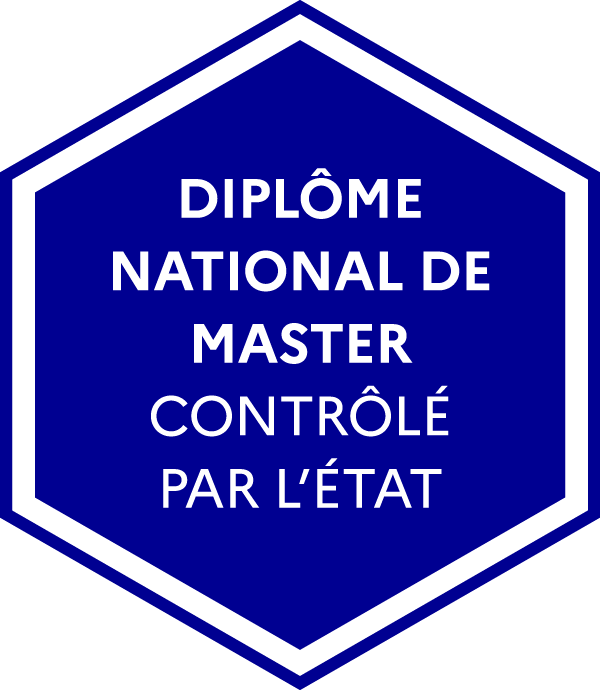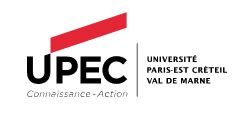Master's degree Chemistry

- Campus Marne la Vallée - Champs sur Marne, Bâtiment Lavoisier
- Bâtiment Lavoisier les mercredis et jeudis

Entry requirements
Students with a Licence degree in Chemistry; Chemistry and Physics; Chemistry and Biology
Benefits of the program
This Chemistry Master's degree provides core training in methods for developing/synthesising, characterising and analysing the properties of molecules or materials. The course also includes modelling modules. The first-year programme covers all areas of chemistry, from physical chemistry to molecular chemistry, as well as certification and quality assurance. Students can specialise in each of these fields in the second year.
Acquired skills
Give students a broad foundation of knowledge on the structure, synthesis and analysis of matter, in relation to its reactivity.
International
Students can carry out funded periods abroad (e.g. Erasmus) through the international relations departments of UGE and UPEC.
Capacities
26
Course venue
Other course venue
Bâtiment Lavoisier les mercredis et jeudis
Your future career
After the first year, four second-year options are available:
- Molecular Physical Chemistry and Applications
- Chemistry of Bioactive Molecules
- Quality Analysis and Assurance (apprenticeship)
- Functional Polymers
The course is suitable for students with career objectives in either research or the professional world. The professional or research-based focus of this second-year Master’s course is determined by the compulsory work placement in the second semester. Students can also enrol in a course at the French Higher Institute for Professorship and Education (INSPE) in chemistry, physics or physics and chemistry.
Professional integration
Students can choose a professional programme in the second year.
Study objectives
Give students a broad foundation of knowledge on the structure, synthesis and analysis of matter, in relation to its reactivity.
Major thematics of study
Chemical synthesis, analytical chemistry, spectroscopy, biotechnology, nano-chemistry, polymer chemistry, environmental chemistry.
Calendar
Second semester
Options
Semester 1: choice of 4 options from: from macro-molecules to polymer materials; nano-chemistry; biotechnology and fine chemistry; biotechnology of recombinant proteins; introduction to quantum mechanics; computer programming 1; modelling in chemistry; environmental chemistry.
Semester 2: choice of 3/4 options from: synthesis strategies in fine chemistry 2; cellular bases of pharmacology and toxicology; surface chemistry and bio-arrays; computer programming 2; applications of physics and quantum chemistry; applications of spectroscopy; advanced modelling; polymers in solution and gels; separative analysis techniques 2
Back-to-school date
09-02-2024
Semester 1
| Courses | ECTS | CM | TD | TP |
|---|---|---|---|---|
|
Electrochimie
* General view of the applications and uses of electrochemistry in the industrial world and in research * Reminder on electrochemical reactions, set-ups, notions of faradic and capacitive currents, ohmic drop, power lines. * Notions of electron transfer and introduction of the kinetic parameters (System slow/fast, constant electrokinetic, diffusion coefficient) * Voltamperometric methods for species in solution in different systems, chronopotentiometry * Application to simple electronic transfers, chemical reactions coupled to electron transfers, electrocatalysis. | 3 | 15h | 10.5h | 4.5h |
|
Chimie de Synthèse
Concepts de base de la Chimie de Synthèse | 3 | 18h | 9h | |
|
Méthodes d'analyse spectroscopiques
Determination and/or confirmation of molecular or macromolecular structures of organic compounds using cross-analysis methods. Emphasis will be placed on the interpretation of the spectra and the use of data for the characterization of compounds and will be limited to brief theoretical recalls. Analysis of molecular or macromolecular organic compounds by UV, IR, RAMAN, NMR, MS, and fluorimetry. | 3 | 18h | 12h | |
|
Techniques d'analyse séparatives 1
Theoretical courses dealing with the fundamental quantities of chromatography, chromatographic equipment, modes of chromatography, and an introduction to electrokinetic methods. | 3 | 12h | 5h | 14h |
|
Anglais
We will work out the spoken english and the written english. We will mainly focus on the analysis of scientific docuements. | 3 | 20h | ||
|
Connaissance de l'entreprise
Notions of optimization and improvement in process engineering: process analysis, implementation, SMED, inventory management, LEAN, 5s, 6-sigma and other, KPI and SMART, HAZOP. | 3 | 20h | ||
|
Stratégies de synthèse en chimie fine 1
Two sections : Retrosynthesis and asymetric synthesis. Basic principles of the disconection approach with the concept of synthetic equivalent for the elaboration of the carbon bones in natural products. Asymetric syntheses from chiral reagents, catalysts or chiral auxiliaries. | 3 | 18h | 9h | |
|
De la macromolécule au matériau polymère
Knowledge and understanding of the specific behaviors of polymers: isolated macromolecule, macromolecule in the mass of amorphous polymer, semi-crystalline polymers, rubber elasticity. | 3 | 14h | 7h | 6h |
|
Nanochimie
Definition and history of nanoscience and nanotechnology. Introduction to synthesis and characterisation of materials. Special properties of nanomaterials. Fields of applications. Nanomaterials in everyday life | 3 | 14h | 7h | 6h |
|
Biotechnologie et chimie fine
Acquisition of conceptual and technical knowledge relating to the production of molecules of interest by microorganisms (bacteria and fungi). Mastering the techniques of analysis and quality control and safety. | 3 | 16h | 11h | |
|
Biotechnologie des protéines recombinantes
Acquisition of conceptual and technical knowledge relating to the production of proteins of interest via various heterologous production systems. | 3 | 11h | 16h | |
|
Introduction à la Mécanique Quantique
Electrons in atoms : electronic configurations and atomic orbitals. Quantum approach of chemical bonding : molecular orbitals. OM diagrams of homo and heteronuclear diatomics. Polyatomic molecules : fragment methods. Pi system study : Hückel method. | 3 | 12h | 12h | 3h |
|
Info programmation 1
Notions on computers, algorithm basics, programming structure, basic instructions. Tests, loops, in/out, functions, polynom interpolation, numerical intergration, node search. Applications to matter sciences. | 3 | 27h | ||
|
Modélisation en chimie
Introduction to modelisation of atoms, molecules and solids structues. Optimisation and visualisation of molecular and cristallographic structures. Applications to the reactivity of simple systems, Lewis acid/base approach, frontier orbitals approach. Use of simple codes and applets of molecular simulations and modelling. | 3 | 12h | 15h | |
|
Chimie de l'environnement
Energetic exchanges in environmental reactions : C and N cylces; Hydeolysis kinetics in natural waters. Main processes and reactions in Environment. Oxidation reactions. Environmental photochemistry. Chemical elements and environmental problems. Toxic organic compounds : pesticides; PCB; HAP, dioxins. Chemical pollution (air, water). | 3 | 18h | 9h | 3h |
Semester 2
| Courses | ECTS | CM | TD | TP |
|---|---|---|---|---|
|
Techniques d'analyse RMN et introduction à l'IRM
Knowledge of the NMR principles and understanding of phenomena related to the chemical structure, conformation and local dynamics of complex molecules. Principles of NMR, Notions of chemical shift and spin-spin coupling, Modes of acquisition of Spectra 1 d 1 H and 13 c NMR, molecular origins of two-dimensional NMR, NMR relaxation, openings to other applications of NMR. | 3 | 15h | 9h | |
|
Polymères biosourcés
| 3 | 14h | 7h | 6h |
|
Micelles emulsions mousses dispersions
Study of Colloids: interparticle Forces, stability of colloids, Interfacial tension, physical chemistry of surfactants: micelles, surfactants at solid and liquid interfaces , emulsions, foams. | 3 | 18h | 8h | 4h |
|
Méthodes d'analyse de surface
Surface and interface definitions. Mechanisms of phenomena at interfaces, balance of forces involved (surface tension, wettability...). Familiarizing yourself with the tools for the characterization of surfaces: microscopy (MOP, SEM, AFM), spectroscopy (XPS, FTIR, raman...), Optics (ellipsometry, SPR) and gravimetry (QCM)... | 3 | 16h | 7h | 4h |
|
Projet ou stage, cycle de conférences
To develop the initiative and the autonomy of chemists towards concrete practical problems by integrating precise data and specifications. This will be done in the form of an experimental laboratory project or a bibliographic project. Attend a lecture cycle and report back. | 3 | |||
|
Anglais scientifique
We will work out the spoken english and the written english. We will mainly focus on the analysis of scientific docuements. | 3 | 30h | ||
|
Stratégies de synthèse en chimie fine 2
Master the methods of synthesis of cyclic compounds according to the ionic and pericyclic approaches. The acquired tools are useful in the continuation of study in master 2 chemistry of bioactive molecules. | 3 | 6h | 3h | 18h |
|
Bases cellulaires de la pharmacologie et toxicologie
Acquire basic knowledge in cell biology, in pharmacology in close connection with chemistry (molecular interactions, relationship structure activity, ...) for the identification / use of therapeutic targets. | 6 | 26h | 16h | 12h |
|
Chimie des surfaces et bioarrays
Chemical modification methods for surfaces and bio-interfaces for sensor applications in biology. | 3 | 17h | 6h | 4h |
|
Info programmation 2
Approximation methods, solving of non linear equations, matrices eigenvalues and eigenvectors calculations. Resolution of linear systems, direct and iterative methods. Application to examples from matter sciences. | 3 | 27h | ||
|
Applications de la physique et chimie quantique
Perturbation and variations theories. Hartree-Fock method. Density Functional Theory. Configuration interaction. Introduction to statistics physics (partition functions, Boltzmann distribution, statistical formulations of thermodynamics values, Monte Carlo method). | 3 | 15h | 12h | 3h |
|
Applications de la spectroscopie
Analysis of IR, UV, microwave and Raman spectra. | 3 | 15h | 9h | 6h |
|
Modélisation avancée
Modelisation in biological systems, solvation. Introduction to molecular dynamics, multi-scale modelisation. | 3 | 15h | 12h | |
|
Polymères en solution et gels
Application of Flory's theories to methods of polymer characterization in solution (osmometry, viscometry, light scattering and size exclusion chromatography). Viscoelastic solutions and Gels | 3 | 14h | 7h | 6h |
|
Techniques d'analyse séparatives 2
Operating principles of electrophoretic and electrochromatographic methods and their range of application in terms of biological / chemical compounds analyzed. Chromatographic methods dedicated to the analysis of biomolecules and biomacromolecules. Master sample preparation methods using miniaturized systems. | 3 | 12h | 7h | 4h |
HOCHLAF Majdi (M1-M2)
LINGUERRI Roberto (M1)
DAULT Marie-laure (M1)
Partners


